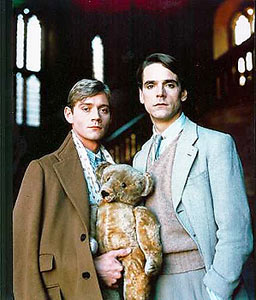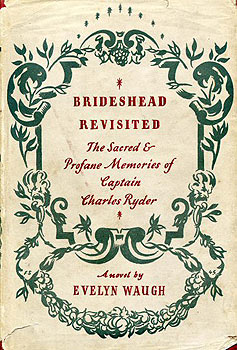Not M-Miss M-M-Mitford: Brideshead Revisited, Revisited
Published on November 29th, 2009 in: Books, Culture Shock, Issues, OMG British R Coming, TV |By Hanna
When it came out in 1981, the Brideshead Revisited TV series starring Jeremy Irons was an event, and something remembered like a significant date in history by a lot of people who were alive then. Its greater cultural importance lay in the fact that it set the standard for all eccentric and twee undergraduate behavior, eventually becoming a staple for undergrad language students in the UK.
The TV series’ cult status arose from a situation that sounds like an urban legend, because it seems strange that people took it seriously at any point, and even stranger that they would try to copy a lifestyle that is presented as, at best, ambiguous in both the book and the series. But it’s true, and especially in the ’80s and ’90s, students took the TV series as a model for their lifestyles, co-opting with enthusiasm a philosophy of life that would most likely have excluded them from it on the basis of their origins, had it been real.

Sebastian, Aloysius, and Charles
However, it was this very real classicism that meant Brideshead Revisited was spared the Truly English status that has been given to its closest relative in terms of cult films, Withnail and I. When I did a course on post-WWII British Comedy in London, the emphasis was entirely on the British aspect of it, which obviously turned into Englishness because none of the people there thought Wales or Scotland or Northern Ireland were in any way important. The professors had not included Withnail and I in the course, yet it seemed to be constantly on the minds of my coursemates, who would turn to it again and again for some idea of what Englishness was in the context of comedy.
Brideshead Revisited, particularly the TV series, has had a similar effect, but not in the minds of the English themselves as much as in the minds of others. Few people outside of the UK would watch Withnail and I and think it was uniquely English. I’ve seen people in “continental” Europe react to it more as a product of its time and of student life, rather than of Englishness. Brideshead, however, is how everyone else likes to see England: tenaciously holding on to the remnants of an idealized upper class life that never existed, and at the same time destroying that life and that class system with all its might.
And obviously, they also like to see England as gay. The public school system never really ceased to be suspicious to the upper classes outside of England, and that brand of twee beauty that was always pointed to as the source of Englishness by my coursemates doesn’t seem as much English to most people here as it seems really, really gay.
Maybe it is the combination of this along with the English sense of being a little bit special, a little bit apart from the “rest” of The Continent, and the paradoxical nationalist sense of uniqueness which all form the basis of the international appeal of Brideshead Revisited and the source of its cult status.

Claimed as essentially English, the characters in the book all lay outside English society, sometimes literally: many of the main characters are essentially banished from England or choose to be exiled. They cannot belong in the society that celebrates them as characters and the embodiment of English eccentricity. The Flyte family itself, ensconced in its great old house and set place in English society, lives on its outskirts, kicked out by reason of their faith and sexuality.
Paradoxically, then, it is that outsider status that binds people together, and which forms a cult around a book that is not about belonging to a nationality, but about not belonging, and thus nationless.
One Response to “Not M-Miss M-M-Mitford: Brideshead Revisited, Revisited”
December 1st, 2009 at 11:06 am
This is an interesting analysis, Hanna. I never made the conscious connection between Brideshead and “outsider” status, but that may have been what attracted me to it at such a young age. That and the overwhelming homoeroticness.
LLM
Time limit is exhausted. Please reload the CAPTCHA.